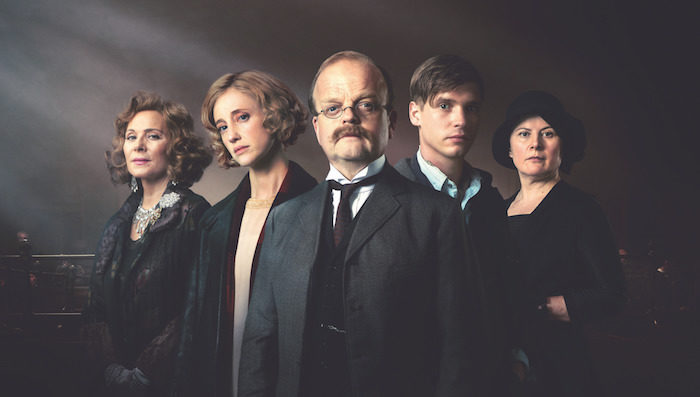UK TV review: The Witness for the Prosecution
Review Overview
Acting
8Direction
8Adaptation
8David Farnor | On 29, Dec 2016
A cat walks across the screen. Bloody paw prints appear behind it on the white carpet. Its owner, Emily French (Kim Cattrall), lays to one side, bludgeoned to death. That striking, nasty image appears early on in The Witness for the Prosecution, the BBC’s latest Agatha Christie adaptation, and it never quite leaves your mind. This, the drama makes clear, isn’t your mum’s Miss Marple. This is murder at its most horrid.
It’s exactly what you expect from screenwriter Sarah Phelps, who penned 2015’s And Then There Were None, a brutal, brooding interpretation of the classic story. After that became a star of the festive TV schedule, it’s no surprise that Phelps was commissioned to adapt another of Agatha’s tales for the screen. The Witness for the Prosecution is far simpler than And Then There Were None, but it’s no less intense; what it lacks in complexity it makes up for in atmosphere and depth. If anything, the result might be even more disturbing.
French’s dead body turns up after she’s begun an affair with young former solider Leonard Vole (Billy Howle), so naturally suspicion falls upon him. What follows is a fantastic exercise in juggling our sympathies. Kim Cattrall is sensationally seductive as the ageing widow, who picks up young men with her purse and leaves them dangling around her little finger. But by the time she’s hit the floor, we’ve had subtle glimpses of her lonely desperation, only reinforced by the growing cruelty of the people around her.
Possessive maid Janet (a fierce Monica Dolan) is ruthless in her attempts to try and break up French and her fling, so when she says she saw Vole leaving the house on the night of the murder, it’s hard to know how much to believe her. Howle, meanwhile, moves from shell-shocked boy to swaggering, suave playboy with a delightfully loathsome sneer, one backed up by the regular payments from his lover, not to mention the knowledge that he’s been made sole beneficiary in her will. When he’s handcuffed and put in the stand, though, there’s still more than a hint of innocence about him – just how far would Janet go to protect her mistress? And what of Vole’s actual girlfriend, Romaine (Andrea Riseborough), a showgirl in a London club?
That’s where things begin to get interesting. Riseborough delivers a stunning performance of jealousy, loyalty, compassion and calculated testimony – she is quick to volunteer as witness for the defence to give Leonard a much-needed alibi. It’s hard not to trust her word, something that Toby Jones’ solicitor, John Mayhew, soon discovers, as he becomes captivated by her performance of Let Me Be Your Sweetheart, sung while hanging from a moon on the stage with all the delicacy of an angel. So who’s telling the truth? And how can Mayhew, a man who believes in justice above all things, do the right thing and save Vole from prison?
This is more legal drama than whodunnit, a smart choice from Phelps that makes for refreshing viewing, compared to traditional festive detective outings. The plot does twist, but with a graceful simplicity, pivoting on uncertainty in a time when uncertainty was in the air. That’s literally the case, thanks to The Crown director Julian Jarrold, who makes that lingering disquiet visible: a yellowy hue haunts every location across London, as if each character is enveloped in the mustard gas of World War I. That memory taints the frame, making everything hard to see and difficult to fathom, a claustrophobic, clinging effect that renders the disillusionment of the post-war survivors almost tangible. The always-magnificent Jones is at the heart of that mood, delivering his vulnerable lines, and trying to redeem his fragile marriage, with a hacking cough that’s as much a product of the recent conflict as the location of his cheap office – in a world of grimy grieving, he suffers even more for the sake of his work.
That heightened context is notable, too, in the treatment of Romaine (an outsider) by her fellow chorus girls, her bond with uncelebrated war hero Leonard forged in flashbacks to their shared trauma in the trenches. This is worlds away from the cosy living rooms of Hercule Poirot, sharing the same harsh world that made Phelps’ And Then There Were None so gripping; Phelps has a keen, cruel eye for the psychology of horror, investigating each character’s motivations with unsettling nuance and unflinching intensity. With such a slight story to tell, the only criticism is that The Witness for the Prosecution could be wrapped up in 90 minutes, rather than a two-hour two-parter, but that would imply that you could possibly want less of this superb piece of stylish television. Like the hazy, lethal smog that pervades the production, this dark Agatha Christie adaptation seeps into your nervous system with spine-chilling precision.
The Witness for the Prosecution is available on Acorn TV, as part of a £4.99 monthly subscription or £49.99 annual subscription. Acorn TV is available on Roku, Fire TV, Android, iOS and Apple TV devices, as well as Amazon Prime Video Channels.






















